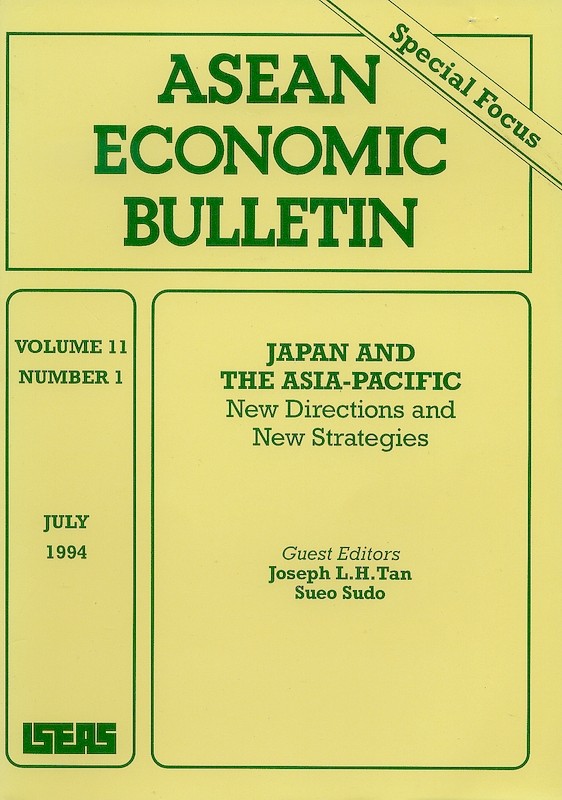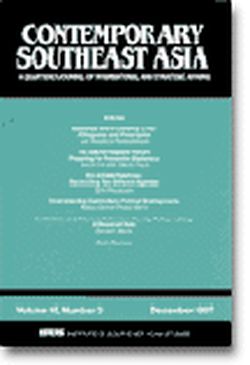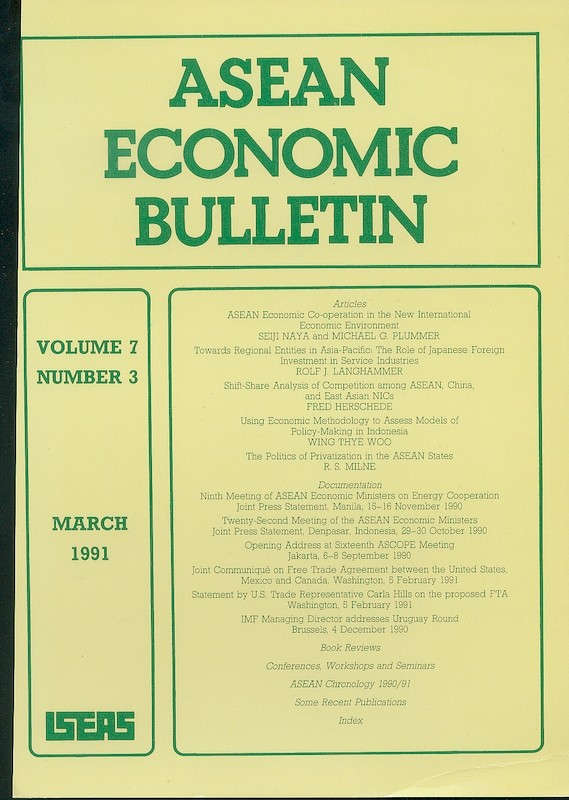ASEAN Economic Bulletin Vol. 11/1 (Jul 1994). Special Focus on "Japan and the Asia-Pacific: New Directions and New Strategies"

Date of publication:
July 1994
Publisher:
Institute of Southeast Asian Studies
Number of pages:
138
Code:
AE11/1
Contents
-
Preliminary pages
- ARTICLES
-
Japan and the Asia-Pacific: Introductory Overview from an ASEAN Perspective, by Joseph L H Tan, author see abstractThis introductory essay attempts to provide a substantive background on the heightening international economic interdependence in both ASEAN and the larger Asia-Pacific, where Japan plays a crucial role. It also outlines a broad array of issues concerning the rapidly changing international environment and focuses on the official policy deliberations concerning new directions for ASEAN-Japan co-operation as a prelude to the summary overview discussion on the various contributions to this issue of the journal. The concluding section examines from an ASEAN perspective a number of major issues in the recent Japanese economic reform in the light of ASEAN-Japan relations.
-
Promotion of SMEs for Industrial Upgrading in ASEAN: A Japanese Proposal for Industrial Co-operation, by Ippei Yamazawa , author see abstractIt is imperative for ASEAN member governments to encourage self-help efforts of their indigenous SMEs by effective nurturing policies. Existing SME policies are associated with the political instruments, emphasis on income distribution effects and obscure efficiency impacts. The author cites Japanese experience in nurturing the SMEs in its industrial development and emphasizes the efficiency aspect of the SME policy. He suggests a guideline for effective SME support policies modeled on the OECD's Positive Adjustment Policies and discusses the formulation of effective SME policies within the APEC framework.
-
Interactions of Japanese Aid and Direct Investment in Indonesia, by Thee Kian Wie, author see abstractThis article discusses a "new" form of Japan's official development assistance (ODA), specifically the relatively small but growing part of Japan's ODA which is directed at promoting more Japanese direct investment in the recipient developing countries. The article provides a brief account of the various activities of Japan's major aid agencies, and argues that this new form of Japan's ODA is quite welcome, as the Indonesian Government has been keen to attract more foreign, including Japanese, direct investment to Indonesia, particularly in export-oriented industries. In addition, while Japanese direct investment is generally viewed in a favourable light in Indonesia, Japanese investors should put higher priority on more effective technology transfer to their Indonesian employees.
-
Comparisons of Japanese Multinationals and Other Firms in Thailand's Non-oil Manufacturing Industries, by Eric D Ramstetter, author see abstractThis study compares average labour productivity, capital intensity, wages, skill intensity, foreign labour dependence, and trade propensities in Japanese firms and other firms in Thailand's non-oil manufacturing industries in 1990. Firm-level analysis reveals that Japanese firms tend to be relatively capital intensive compared to all other firm groups, pay higher wages compared to local firms as do other foreign firms, be less skill intensive than firms from developed economies, and depend more on foreign workers than do local firms or other developed economy firms, though this dependence is even higher in developing economy firms. All firms with high foreign ownership shares had relatively large export propensities. However, there were few differences between local firms and foreign firms in labour productivity and import propensities. Results thus indicate that Japanese multinationals may not differ that much from other multinationals in many respects, despite obvious differences in corporate structures and practices.
-
Japan and Southeast Asia in the Post-Cambodian Conflict Era, by Sueo Sudo, author see abstractJapanese foreign policy today has to a great extent been influenced by two related factors: the post-hegemonic environment and a new regionalism. Active pursuit of Japan's policy towards Asia as a whole, and Southeast Asia in particular, is seen in three areas: strengthening official relations, sending peace-keeping forces to Cambodia, and maintaining economic dynamism in the region. However, it is also true that Japan's closer political and economic relations with Southeast Asia have come to be perceived negatively by the United States, with whom Japan has maintained its closest ties. Hence, whether or not Japan seeks regionalism remains the biggest diplomatic question in the 1990s.
-
Japan and East Asian Regionalism, by Javed Maswood, author see abstractThis article assesses and evaluates Japan's leadership role within the Asia-Pacific region. Analysts have suggested that it is inevitable that Japan will lead the creation, and become the nucleus, of some form of economic regionalism in this region. After examining trade and monetary relations within the region, it is concluded that there is no structural basis for the formation of an Asian economic bloc. It is unlikely that the Japanese Government will want to jeopardize close links with the United States or the underpinnings of the Nichibei economy. If there is a regional economic role for Japan, it must be as a market for manufactured exports from other Asian countries. While the recession has been deeper and lasted longer than anticipated, the fundamentals of the Japanese economy remain sound and eventual recovery will no doubt recreate the conditions for the Japanese economy to act as a large export market for Asian manufacturers. This will enable harmonious growth in trade relations across the Pacific, provided that the more immediate problem of U.S.-Japan trade friction is satisfactorily resolved.
-
Japan's Asian Identity: Concerns for ASEAN-Japan Relations, by Wilfrido Villacorta, author see abstractThis article addresses the thesis that Japan is beginning to identify itself more with its Asian neighbours. The direction of a country's economic and foreign policy is shaped by the dictates of both its economy and political system. It was necessary to review the development of Japan's diplomacy towards the United States and ASEAN countries. The major currents of thought in Japan concerning the integration of the Asia-Pacific economies were also examined. The article concludes that it is in the interest of Japan to remain within the ambit of its special relations with the United States. Despite their burgeoning trade with, and investment in, Asian countries the Japanvalue very highly the huge market and security umbrella which the United States provides. The present trade dispute is not enough to disturb these special relations, especially with the threat posed by North Korea. ASEAN-Japan relations will continue to develop within the framework of the U.S.-Japan alliance.
-
DOCUMENTATION: Communiqu on the Meeting of the OECD Council at Ministerial Level, Paris, 7-8 June 1994
-
DOCUMENTATION: Opening Address by Prime Minister Goh Chok Tong on "Asia: Opportunities, Not Threats", at The Asia Society International Corporate Conference, Singapore, 17 May 1994
-
DOCUMENTATION: Joint Communiqu on the 10th ASEAN Labour Ministers' Meeting, Singapore, 16-17 May 1994
-
DOCUMENTATION: Joint Press Statement on the Meeting of the 12th U.S.-ASEAN Dialogue, Washington, D.C., 9-10 May 1994
-
DOCUMENTATION: Joint Press Release on the 16th ASEAN-Australia Forum, Canberra, 3-4 May 1994
-
BOOK REVIEW: Asia Pacific: A View on its Role in the New World Order, by Michael Dobbs-Higginson, by Paul Y Hammond, author
-
BOOK REVIEW: Defending Values, Promoting Change Social Justice in a Global Economy: An ILO Agenda. Report of the Director-General, International Labour Conference, 81st Session, by Ozay Mehmet, author
-
BOOK REVIEW: Challenge and Response: Thirty Years of the Economic Development Board, by Linda Low, Toh Mun Heng, Soon Teck Wong, Tan Kong Yam and Helen Hughes., by Stephen Guisinger, author
-
BOOK REVIEW: Employment Generation through Private Entrepreneurship in Vietnam, by Per Ronnas, by Carolyn L Gates, author
-
BOOK REVIEW:The Role of Japan in Asia, by Shinichi Ichimura., by Joseph L H Tan, author
-
Conferences, Workshops and Seminars
-
ASEAN Chronology 1994
-
Some Recent Publications



